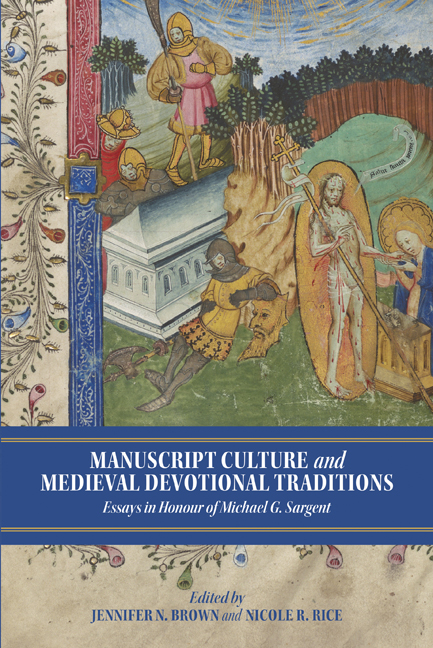Book contents
- Frontmatter
- Dedication
- Contntes
- List of Illustrations
- Acknowledgements
- List of Abbreviations
- Michael Sargent: An Appreciation
- I Manuscript Transmission and Textual Adaptation
- II Translated Texts and Devotional Implications
- III Rhetorical Strategies and Spiritual Transformations
- IV Texts and Contours of Religious Life
- Bibliography
- List of Contributors
- Michael G. Sargent’s Publications
- Index
- Tabula Gratulatoria
- York Manuscript and Early Print Studies
3 - What Do the Numbers Mean? The Case for Corpus Studies
Published online by Cambridge University Press: 24 March 2021
- Frontmatter
- Dedication
- Contntes
- List of Illustrations
- Acknowledgements
- List of Abbreviations
- Michael Sargent: An Appreciation
- I Manuscript Transmission and Textual Adaptation
- II Translated Texts and Devotional Implications
- III Rhetorical Strategies and Spiritual Transformations
- IV Texts and Contours of Religious Life
- Bibliography
- List of Contributors
- Michael G. Sargent’s Publications
- Index
- Tabula Gratulatoria
- York Manuscript and Early Print Studies
Summary
Michael Sargent's 2008 essay ‘What Do the Numbers Mean?’ in Design and Distribution of Late Medieval Manuscripts in England subtly shifted the scope of what is possible for the literary historian of medieval manuscripts. For a young Ph.D. candidate encountering a constellation of an expansive and temporally exotic literary culture, that essay sparked a revelation about the untapped knowledge that must lie in manuscript corpus data in the aggregate. I echoed Michael's title, asking myself ‘what do the numbers mean?’ What could they mean if we had more of them? If we had all of them? Rather than focus on case studies and canonical work, what would we uncover if we tried to count – or be accountable to – the numbers of manuscripts, the vicissitudes of multiple copies and the numerous anonymous works existing in single copies? What would late medieval literary culture look like if we were able to bring the contours of its totality into view? Michael's work suggested an entirely unexplored field of quantitative codicology.
If we are to take on such a quantitatively – and therefore computationally assisted – codicology, we must redefine the corpus as a new object of inquiry for literary historians. ‘The corpus’ is not new to manuscript scholars, and in some sense has always haunted literary and historical work that takes on manuscript analysis. What I am suggesting here, however, is that we should move the spectre of the corpus into the foreground and attempt to understand its whole as integral to how we understand the work of writing itself.
This view is available to us only through data and the aggregate reading that it enables. Because a corpus that is not flattened in the service of providing an authorial text is a larger, more complex, more multiple and less totalized phenomenon, it requires an expanded set of tools to become legible. When these tools are brought to bear on the larger phenomenon, we might call what we are doing ‘corpus studies’ to reflect the way in which the methodology holds itself accountable to the work of literature as it is constituted by its whole corpus, not merely an edited text or a particular manuscript.
- Type
- Chapter
- Information
- Manuscript Culture and Medieval Devotional TraditionsEssays in Honour of Michael G. Sargent, pp. 48 - 83Publisher: Boydell & BrewerPrint publication year: 2021



